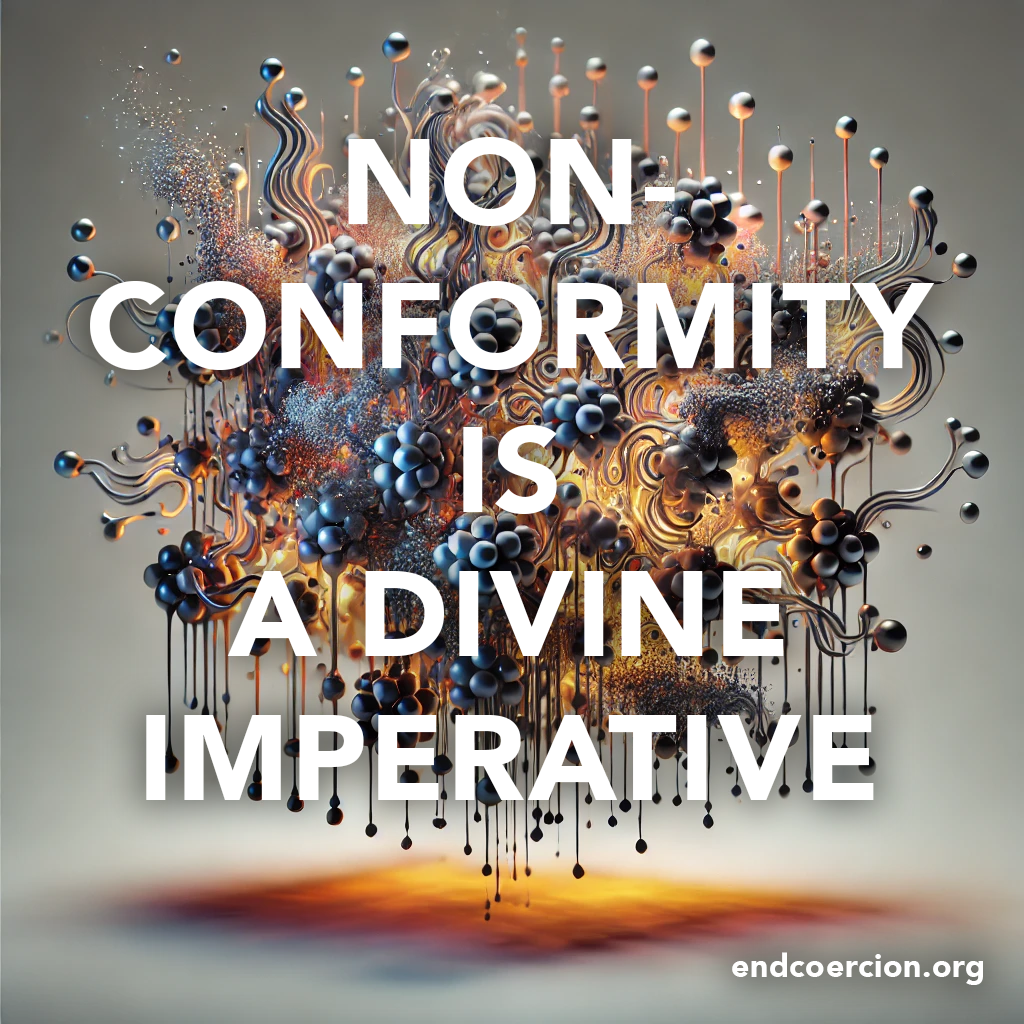Be not conformed to this world: but be transformed by the renewing of your mind. Romans 12:2
“Do not conform” is difficult advice in a generation when crowd pressures have unconsciously conditioned our minds and feet to move to the rhythmic drumbeat of the status quo. Many voices and forces urge us to choose the path of least resistance, and bid us never to fight for an unpopular cause and never to be found in a pathetic minority of two or three.
Success, recognition, and conformity are the bywords of the modern world where everyone seems to crave the anesthetizing security of being identified with the majority.
Mass Mind or Transformed Mind?
In spite of this prevailing tendency to conform, we as Christians have a mandate to be nonconformists. The Apostle Paul, who knew the inner realities of the Christian faith, counseled, “Be not conformed to this world: but be ye transformed by the renewing of your mind.” We are called to be people of conviction, not conformity; of moral nobility, not social respectability. We are commanded to live differently and according to a higher loyalty.
Every true Christian is a citizen of two worlds, the world of time and the world of eternity. We are, paradoxically, in the world and yet not of the world. To the Philippian Christians, Paul wrote, “We are a colony of Heaven.” Living in the colony of time, we are ultimately responsible to the empire of eternity. As Christians we must never surrender our supreme loyalty to any time-bound custom or Earth-bound idea, for at the heart of our universe is a higher reality – God and his kingdom of love – to which we must be conformed.
This command not to conform comes not only from Paul but also from our Lord and Master, Jesus Christ, the world’s most dedicated nonconformist, whose ethical nonconformity still challenges the conscience of mankind.
Everywhere and at all times, the love ethic of Jesus is a radiant light revealing the ugliness of our stale conformity.
In spite of this imperative demand to live differently, we have cultivated a mass mind and have moved from the extreme of rugged individualism to the even greater extreme of rugged collectivism. We are not makers of history; we are made by history. Longfellow said, “In this world a man must either be anvil or hammer,” meaning that he is either a molder of society or is molded by society. Who doubts that today most men are anvils and are shaped by the patterns of the majority? Or to change the figure, most people, and Christians in particular, are thermometers that record or register the temperature of majority opinion, not thermostats that transform and regulate the temperature of society.
Silent Behind Stained Glass Windows
Nowhere is the tragic tendency to conform more evident than in the church, an institution that has often served to crystallize, conserve, and even bless the patterns of majority opinion. The erstwhile sanction by the church of slavery, racial segregation, war, and economic exploitation is testimony to the fact that the church has hearkened more to the authority of the world than to the authority of God. Called to be the moral guardian of the community, the church at times has preserved that which is immoral and unethical. Called to combat social evils, it has remained silent behind stained-glass windows. Called to lead men on the highway of brotherhood and to summon them to rise above the narrow confines of race and class, it has enunciated and practiced racial exclusiveness.
We preachers have also been tempted by the enticing cult of conformity. Seduced by the success symbols of the world, we have measured our achievements by the size of our parsonage. We have become showmen to please the whims and caprices of the people. We preach comforting sermons and avoid saying anything from our pulpit that might disturb the respectable views of the comfortable members of our congregations. Have we ministers of Jesus Christ sacrificed truth on the altar of self-interest and, like Pilate, yielded our convictions to the demands of the crowd?
We need to recapture the gospel glow of the early Christians, who were nonconformists in the truest sense of the word and refused to shape their witness according to the mundane patterns of the world. Willingly they sacrificed fame, fortune, and life itself in behalf of a cause they knew to be right. Quantitatively small, they were qualitatively giants. Their powerful gospel put an end to such barbaric evils as infanticide and bloody gladiatorial contests. Finally, they captured the Roman Empire for Jesus Christ.
Gradually, however, the church became so entrenched in wealth and prestige that it began to dilute the strong demands of the gospel and to conform to the ways of the world. And ever since the church has been a weak and ineffectual trumpet making uncertain sounds. If the church of Jesus Christ is to regain once more its power, message, and authentic ring, it must conform only to the demands of the gospel.
The hope of a secure and livable world lies with disciplined nonconformists, who are dedicated to justice, peace, and brotherhood. The trailblazers in human, academic, scientific, and religious freedom have always been nonconformists. In any cause that concerns the progress of mankind, put your faith in the nonconformist!
Creative Nonconformity
Nonconformity in itself, however, may not necessarily be good and may at times possess neither transforming nor redemptive power. Nonconformity per se contains no saving value and may represent in some circumstances little more than a form of exhibitionism. Paul in the latter half of the text offers a formula for constructive nonconformity: “Be ye transformed by the renewing of your mind.” Nonconformity is creative when it is controlled and directed by a transformed life and is constructive when it embraces a new mental outlook. By opening our lives to God in Christ we become new creatures. This experience, which Jesus spoke of as the new birth, is essential if we are to be transformed nonconformists and freed from the cold hardheartedness and self-righteousness so often characteristic of nonconformity. Someone has said, “I love reforms but I hate reformers.” A reformer may be an untransformed nonconformist whose rebellion against the evils of society has left him annoyingly rigid and unreasonably impatient.
Only through an inner spiritual transformation do we gain the strength to fight vigorously the evils of the world in a humble and loving spirit. The transformed nonconformist, moreover, never yields to the passive sort of patience that is an excuse to do nothing. And this very transformation saves him from speaking irresponsible words that estrange without reconciling and from making hasty judgments that are blind to the necessity of social progress. He recognizes that social change will not come overnight, yet he works as though it is an imminent possibility.
This hour in history needs a dedicated circle of transformed nonconformists. Our planet teeters on the brink of atomic annihilation; dangerous passions of pride, hatred, and selfishness are enthroned in our lives; truth lies prostrate on the rugged hills of nameless calvaries; and men do reverence before false gods of nationalism and materialism. The saving of our world from pending doom will come, not through the complacent adjustment of the conforming majority, but through the creative maladjustment of a nonconforming minority.
Creatively Maladjusted
Some years ago Professor Bixler reminded us of the danger of overstressing the well-adjusted life. Everybody passionately seeks to be well-adjusted. We must, of course, be well-adjusted if we are to avoid neurotic and schizophrenic personalities, but there are some things in our world to which men of goodwill must be maladjusted. I confess that I never intend to become adjusted to the evils of segregation and the crippling effects of discrimination, to the moral degeneracy of religious bigotry and the corroding effects of narrow sectarianism, to economic conditions that deprive men of work and food, and to the insanities of militarism and the self-defeating effects of physical violence.
Human salvation lies in the hands of the creatively maladjusted. We need today maladjusted men like Shadrach, Meshach, and Abednego, who, when ordered by King Nebuchadnezzar to bow before a golden image, said in unequivocal terms, “If it be so, our God whom we serve is able to deliver us. But if no, we will not serve thy gods”; like Thomas Jefferson, who in an age adjusted to slavery wrote, “We hold these truths to be self-evident, that all men are created equal, that they are endowed by their Creator with certain unalienable Rights, that among these are Life, Liberty, and the Pursuit of Happiness”; like Abraham Lincoln, who had the wisdom to discern that this nation could not survive half slave and half free; and supremely like our Lord, who, in the midst of the intricate and fascinating military machinery of the Roman Empire, reminded his disciples that “they that take the sword shall perish with the sword.”
Through such maladjustment an already decadent generation may be called to those things that make for peace.
Costly Choices
Honesty impels me to admit that transformed nonconformity, which is always costly and never altogether comfortable, may mean walking through the valley of the shadow of suffering, losing a job, or having a six-year-old daughter ask, “Daddy, why do you have to go to jail so much?” But we are gravely mistaken to think that Christianity protects us from the pain and agony of mortal existence. Christianity has always insisted that the cross we bear precedes the crown we wear. To be a Christian, one must take up his cross, with all of its difficulties and agonizing and tragedy-packed content, and carry it until that very cross leaves its marks upon us and redeems us to that more excellent way that comes only through suffering.
In these days of worldwide confusion, there is a dire need for men and women who will courageously do battle for truth. We must make a choice. Will we continue to march to the drumbeat of conformity and respectability, or will we, listening to the beat of a more distant drum, move to its echoing sounds? Will we march only to the music of time, or will we, risking criticism and abuse, march to the soul saving music of eternity?
More than ever before, we are today challenged by the words of yesterday, “Be not conformed to this world: but be transformed by the renewing of your mind.”
This is an abbreviated version of one of Rev. Dr. King’s sermons preached in November of 1954 at Dexter Avenue Baptist Church.



